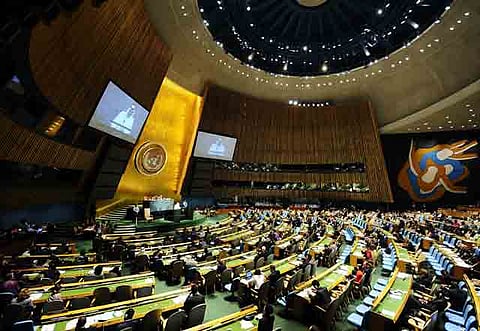West warned that insulting Islam risks 'civilisation clash'
Leaders from Muslim nations appeal at UN for the West to clampdown on attacks on Islam

United Nations: Kings, Emirs and presidents from Muslim nations have made pressing appeals at the United Nations for the West to clampdown on attacks on Islam, which they warned is a growing threat to international security.
In speeches to the UN General Assembly, leaders said that "Islamophobia" was causing a growing Muslim-West divide and one top Arab minister put the international community on guard against a "civilisation clash".
A threat to burn the Quran by a fringe US church, controversy over a proposed mosque near the scene of the September 11, 2001 attacks in New York and assaults on Islamic symbols in European countries have been a major talking point for Muslim nations.
Normally strong allies of the West have spoken out at the UN against the growing religious tensions in the past week.
Many were embarrassed by comments by Iran's President Mahmoud Ahmadinejad linking the US government to 9/11, diplomats said.
But Shaikh Hamad Bin Khalifa Al Thani, the Emir of Qatar, who has launched western-backed diplomatic initiatives to settle wars ranging from Sudan to the Israel-Palestian conflict, condemned attempts to link Islam with terrorism. He partly blamed the US "War on Terror" declared after September 11.
"We disagree with the attribution of this so-called terrorism to the Islamic religion because this - in addition to being incorrect - is a historical injustice that is refuted by evidence from recent history."
He said "gratuitous violent actions" in the United States, Europe and Asia in the late 20th century were never labelled as being American, European or Asian terrorism.
"This violence was attributed to its underlying political, economic, social and even ideological causes, without attributing it to a particular religion, country or idea."
Egypt's Foreign Minister Ahmad Abul Gheit condemned "regrettable and appalling incidents that have increasingly touched Muslims and Islam, repeatedly and sometimes systematically in certain cases."
He added: "We find the West, in general, being drawn into a clash with the Muslim world. This clash will serve no one except extremists and those who hold perverted ideas on both sides. It will not be in the interest of security and stability in the world."
Gheit called for Western governments to take action, including passing laws.
"We call upon all countries and especially governments, to assume their responsibility to confront the specter of a dreadful religious and civilisation clash."
King Abdullah II of Jordan said it is "essential to resist forces of division that spread misunderstanding." He called for an annual World Interfaith Harmony Week to promote tolerance.
Malaysia's Prime Minister Najib Razak told the UN assembly that the world's 1.5 billion Muslims were offended by "attempts to demonise Islam."
He added: "It intensifies the divide between the broad Muslim world and the West."


